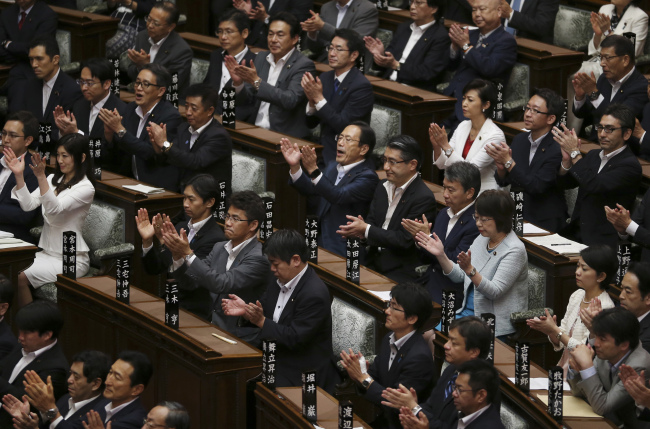Japan’s parliament early Saturday approved contentious legislation that enhances the role of the country‘s military by loosening post-World War II constraints, after the ruling bloc defeated opposition parties’ last-ditch effort to block a vote.

The upper house’s approval makes the legislation into law, reinterpreting Japan’s constitution and fundamentally changing the way it uses its military. Opponents say it violates Japan‘s constitution and puts the country at risk of becoming embroiled in U.S.-led wars.
The legislation has sparked sizeable protests and debate about whether Japan should shift away from its pacifist ways to face growing security challenges. Rallies have spread across the nation especially after the ruling parties approved the bills in July in the more powerful lower house.
Japan’s military can now defend its allies even when the country isn’t under attack — for the first time since the end of the World War II — and work more closely with the U.S. and other nations. Japan will also be able to participate more fully in international peacekeeping, compared to its previous, mostly humanitarian, missions.
“The legislation is necessary in order to protect the people’s lives and their peaceful livelihood, and it is to prevent a war,” Prime Minister Shinzo Abe told reporters after the passage of a total of 11 bills — one related to international peacekeeping and a package of 10 others designed to allow Japan‘s military to defend its allies in an action called “collective self-defense.”
Dozens of constitutional scholars, lawyers and other legal experts have joined protests, saying the legislation allowing Japan to use force to settle international disputes violates its U.S.-drafted postwar constitution that renounces a right to wage war.
China said it and other Asian neighbors are closely watching the vote because of Japan’s wartime aggression.
“We demand that Japan genuinely listen to just appeals from both at home and abroad, learning from historical lessons and adhering to the path of peaceful development,” said Chinese Foreign Ministry spokesman Hong Lei.
Previous postwar governments had all made the notion of collective self-defense unconstitutional. But Abe’s Cabinet last year decided to allow it by unilaterally adopting a new interpretation of the constitution, instead of formally revising the charter, saying it must be adapted to today’s increasingly challenging security environment. The constitutional reinterpretation triggered public criticism that Abe‘s government undermined democracy. Opponents also say the change would cause Japan to do more in the bilateral alliance with the U.S.
In Washington, leaders of Senate committees overseeing U.S. defense and foreign policy welcomed the legislation’s passage, saying it would contribute to international peace and security and strengthen the U.S.-Japan alliance.
“We welcome a larger role for Japan in regional and global security affairs and look forward to our country working with Japan to implement these new measures,” the Republican and Democratic committee leaders said in a joint statement Friday. (AP)




![[Herald Interview] 'Amid aging population, Korea to invite more young professionals from overseas'](http://res.heraldm.com/phpwas/restmb_idxmake.php?idx=644&simg=/content/image/2024/04/24/20240424050844_0.jpg&u=20240424200058)












![[KH Explains] Korean shipbuilding stocks rally: Real growth or bubble?](http://res.heraldm.com/phpwas/restmb_idxmake.php?idx=652&simg=/content/image/2024/04/25/20240425050656_0.jpg&u=)

